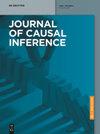根据观察性研究设计实验
IF 1.8
4区 医学
Q2 MATHEMATICS, INTERDISCIPLINARY APPLICATIONS
引用次数: 11
摘要
被动观测数据的可用性越来越高,使得人们对“数据融合”方法越来越感兴趣,这种方法涉及将观测和实验来源的数据合并以得出因果结论。这种方法通常需要在观测数据集中的未知偏差和实验数据集中通常较大的方差之间进行不稳定的权衡。我们提出了一种替代方法,避免了这种权衡:而不是使用观测数据进行推理,我们使用它来设计一个更有效的实验。我们考虑具有二元结果的分层实验的情况,并假设可以从观测研究中获得地层潜在结果方差的初步估计。我们扩展现有的结果,为这些方差生成置信集,同时考虑到不可测量的混杂的可能性。然后,我们将实验设计问题作为一个受我们的置信集约束的遗憾最小化问题。我们证明了这个问题可以转化为一个凹最大化问题,并使用常规方法求解。最后,我们利用妇女健康倡议的数据证明了我们的方法的实际效用。本文章由计算机程序翻译,如有差异,请以英文原文为准。
Designing experiments informed by observational studies
Abstract The increasing availability of passively observed data has yielded a growing interest in “data fusion” methods, which involve merging data from observational and experimental sources to draw causal conclusions. Such methods often require a precarious tradeoff between the unknown bias in the observational dataset and the often-large variance in the experimental dataset. We propose an alternative approach, which avoids this tradeoff: rather than using observational data for inference, we use it to design a more efficient experiment. We consider the case of a stratified experiment with a binary outcome and suppose pilot estimates for the stratum potential outcome variances can be obtained from the observational study. We extend existing results to generate confidence sets for these variances, while accounting for the possibility of unmeasured confounding. Then, we pose the experimental design problem as a regret minimization problem subject to the constraints imposed by our confidence sets. We show that this problem can be converted into a concave maximization and solved using conventional methods. Finally, we demonstrate the practical utility of our methods using data from the Women’s Health Initiative.
求助全文
通过发布文献求助,成功后即可免费获取论文全文。
去求助
来源期刊

Journal of Causal Inference
Decision Sciences-Statistics, Probability and Uncertainty
CiteScore
1.90
自引率
14.30%
发文量
15
审稿时长
86 weeks
期刊介绍:
Journal of Causal Inference (JCI) publishes papers on theoretical and applied causal research across the range of academic disciplines that use quantitative tools to study causality.
 求助内容:
求助内容: 应助结果提醒方式:
应助结果提醒方式:


